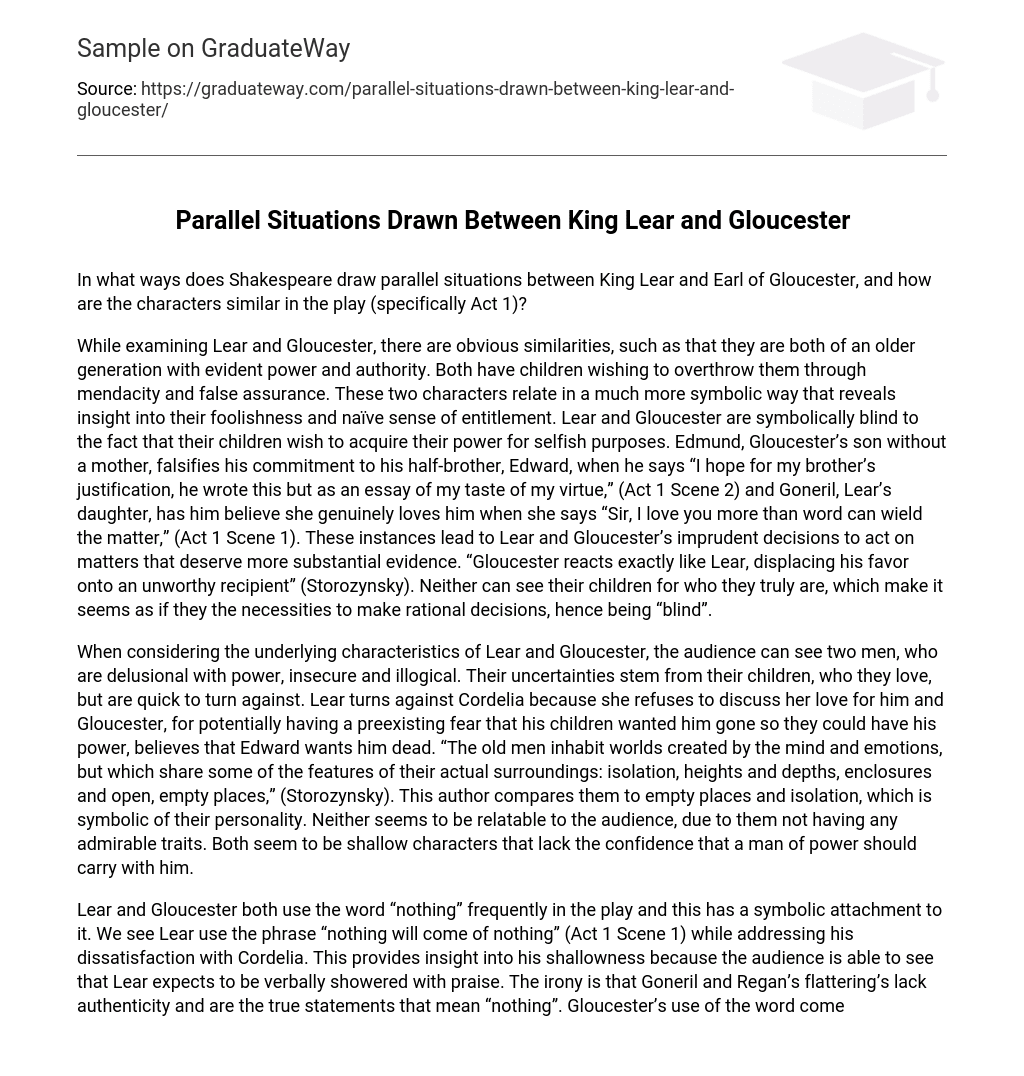Shakespeare draws parallel situations and explores similarities between the characters of King Lear and Earl of Gloucester in Act 1 of the play.
When examining Lear and Gloucester, it is evident that they share similarities. Both characters belong to an older generation and possess power and authority. Additionally, they both have children who aim to overthrow them through deceit and false assurances. These similarities symbolically highlight their foolishness and naive sense of entitlement. Both Lear and Gloucester are blind to the fact that their children have selfish intentions to acquire their power. Gloucester’s son, Edmund, who lacks a mother, falsely claims his loyalty to his half-brother Edward by stating, “I hope for my brother’s justification, he wrote this but as an essay of my taste of my virtue” (Act 1 Scene 2). Similarly, Lear’s daughter Goneril deceives him into believing that she genuinely loves him by stating, “Sir, I love you more than word can wield the matter” (Act 1 Scene 1). These instances lead both Lear and Gloucester to make imprudent decisions without substantial evidence. As Storozynsky states, “Gloucester reacts exactly like Lear, displacing his favor onto an unworthy recipient.” Consequently, their inability to see their children’s true nature renders them incapable of making rational decisions, illustrating their metaphorical blindness.
The analysis of Lear and Gloucester reveals that both men possess traits such as delusion, insecurity, and irrationality due to their relationship with their children. Lear turns against Cordelia for not expressing her love for him, while Gloucester fears that his children are plotting against him. According to Storozynsky, these men live in a self-created world marked by isolation, heights, depths, enclosures, and emptiness. This comparison symbolizes their personalities. Unfortunately, neither character seems relatable or admirable to the audience as they lack the confidence expected from powerful individuals.
Lear and Gloucester both frequently use the word “nothing” in the play, and it holds symbolic meaning. In Act 1 Scene 1, Lear expresses his dissatisfaction with Cordelia by saying “nothing will come of nothing,” revealing his shallowness as he desires praise. Ironically, Goneril and Regan’s flattery means “nothing” and lacks authenticity. In Act 1 Scene 2, Gloucester notices Edmund hiding a letter and comments, “The quality of nothing hath not need to hide itself.” Like Lear, Gloucester falls victim to deceitful appearances. They displace this concept of nothing onto others instead of self-assessing. Their ignorance and presumptuous attitudes reflect why their personalities are shallow and unfulfilling.
In Act 1, the audience gains insight into the dramatic irony present in both parallel situations. However, there are four additional Acts in King Lear. The younger greedy rulers (Goneril, Regan, and Edmund) anticipate displacing the older generation Lear and Gloucester. While conversing with the fool, Lear realizes that he may have made a mistake by bestowing his power upon his daughters. He expresses concern about his mental health, exclaiming, “O, let me not be mad, not mad sweet heaven!” This foreshadows future events in the book. Given the parallel situations of Gloucester and Lear, both will continue to descend into chaos and ignorance.





